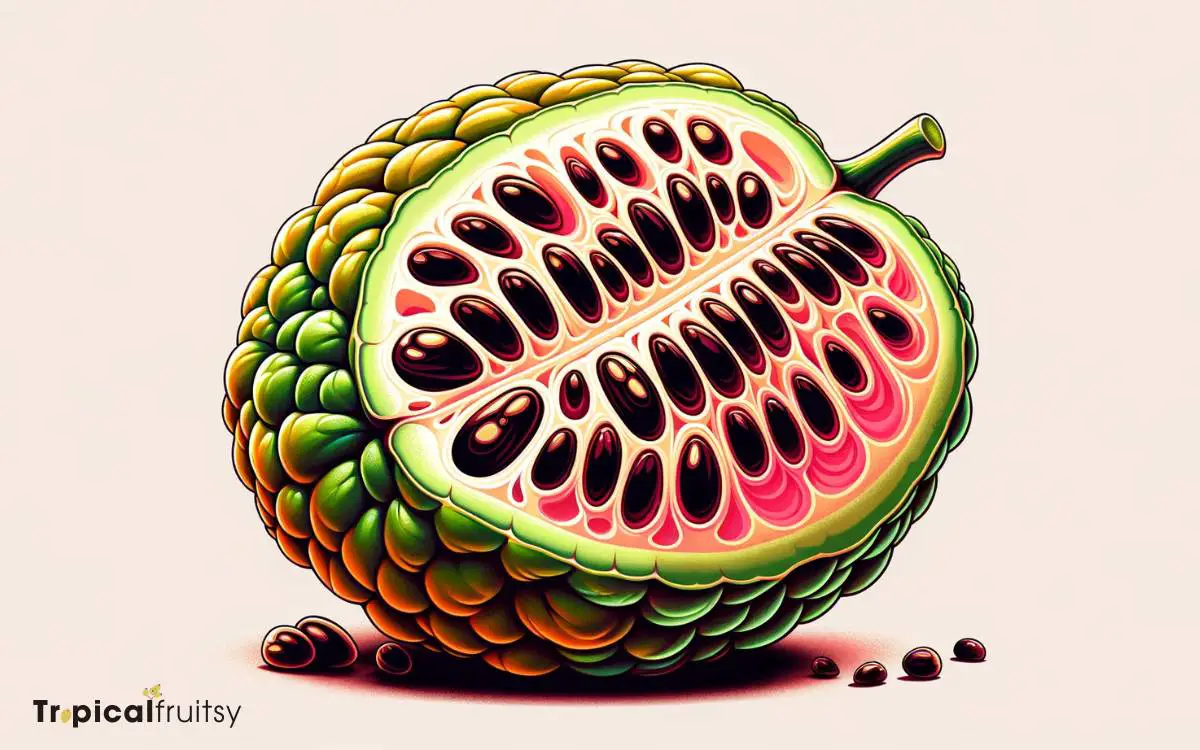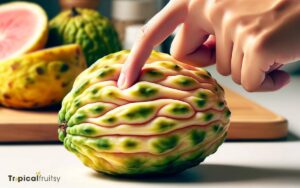Can You Eat Cherimoya Seeds? No!
No, you should not eat cherimoya seeds as they contain toxic compounds that can be harmful if ingested. It is important to remove and discard the seeds before consuming the fruit.
Cherimoya seeds contain toxic substances, including annonacin, which is a neurotoxin. Ingesting these seeds can lead to negative health effects such as gastrointestinal issues and neurological problems.
To enjoy cherimoya safely:
The fruit’s flesh is nutritious and offers health benefits, such as vitamin C, fiber, and antioxidants. However, the seeds should never be consumed.
Cherimoya’s flesh is a sweet delight, but its seeds are a hidden hazard to be avoided.

Key Takeaway
Cherimoya Seeds: Edibility and Health Impact
| Component | Found In | Edibility | Effects on Health |
|---|---|---|---|
| Cherimoya Flesh | Cherimoya Fruit | Edible | Nutritious and safe to consume, offering vitamins and antioxidants. |
| Cherimoya Seeds | Inside the Fruit | Inedible | Contains toxic compounds like annonacin; can cause health issues if ingested. |
Understanding Cherimoya Seeds
Typically, cherimoya seeds aren’t consumed due to their toxic properties. Scientific analysis reveals that these seeds contain alkaloids, such as annonacin, which can be neurotoxic if ingested in sufficient quantities.
It’s crucial to understand that while the flesh of the cherimoya fruit is both safe and nutritious, consuming the seeds poses health risks.
Studies suggest that the toxic elements can affect the nervous system, and there’s a potential link to neurological diseases when consumed in large amounts or over a prolonged period. Therefore, caution is advised when handling and consuming cherimoya.
Consumers should ensure they fully remove and discard the seeds to avoid accidental ingestion, prioritizing safety and health in their dietary choices.
Potential Risks of Ingestion
Ingesting cherimoya seeds can lead to severe health complications due to their toxic alkaloids, including the risk of neurotoxicity and a potential association with neurological disorders.
Research indicates that these seeds contain compounds that, if consumed, can affect the nervous system, potentially leading to symptoms such as nausea, vomiting, and even convulsions in extreme cases.
It’s crucial for individuals to be aware that while the flesh of the cherimoya is safe and nutritious, the seeds aren’t meant to be eaten.
Care should be taken to remove and discard them before consumption of the fruit. This cautious approach ensures the avoidance of any adverse health effects.
Now, turning attention away from the risks, it’s important to consider the numerous health benefits of cherimoya itself.
Health Benefits of Cherimoya
One can enjoy numerous health benefits from the cherimoya fruit, as it’s packed with essential vitamins, minerals, and antioxidants.
The fruit is a rich source of vitamin C, known for its immune-boosting properties, and dietary fiber, which promotes digestive health. It also contains B vitamins, crucial for energy metabolism, and potassium, which helps maintain cardiovascular health.
The presence of antioxidants like flavonoids may reduce the risk of chronic diseases. However, while these benefits are promising, they must be balanced against potential risks, particularly from the seeds, which aren’t safe to consume.
The full nutritional impact depends on individual health profiles and dietary needs.
With the advantages in mind, it’s important to consider safe consumption practices.
Safe Consumption Practices
A cherimoya’s seeds are toxic and should never be ingested, so it’s crucial to remove them before consumption. When preparing a cherimoya, individuals must exercise diligence, carefully extracting each seed to prevent accidental ingestion.
The seeds contain toxic compounds that can have harmful effects on the human body. Therefore, meticulousness can’t be overstated during the preparation process.
It’s also advisable to avoid blending the fruit in a way that could accidentally pulverize the seeds, as this might release the toxins into the flesh of the fruit.
To further ensure safety, consumers should educate themselves on proper handling techniques, reinforcing an awareness of the risks associated with these seeds.
This cautionary approach will lead us into considering alternatives to seed consumption that can provide similar health benefits without the associated dangers.
Alternatives to Seed Consumption
Recognizing the hazards of cherimoya seeds, consumers can explore alternative sources of nutrients that offer similar health benefits without the risks.
Various fruits and vegetables provide comparable vitamins, minerals, and antioxidants. For instance, papayas and mangos, like cherimoya, are rich in vitamin C and dietary fiber. They’re widely accepted as safe when consumed properly.
Additionally, seeds such as chia or flaxseed are often recommended for their omega-3 fatty acids and don’t pose the same health risks as cherimoya seeds.
Careful selection of these alternatives ensures that individuals don’t miss out on essential nutrients while avoiding potential toxicity.
It’s crucial to research and consult with health professionals to make informed decisions about dietary choices, especially when substituting certain foods or ingredients.
Conclusion
In the garden of edibles, cherimoya is a luscious fruit, but its seeds are a forbidden apple. While cherimoya offers a cornucopia of health benefits, its seeds harbor potential risks, masked by their innocent appearance.
One must navigate this nutritional labyrinth with care, adhering to safe consumption practices.
Wisdom dictates that we relish the flesh of cherimoya and leave its seeds untouched, as alternatives abound for those seeking the full bounty of this exotic fruit’s offerings.






